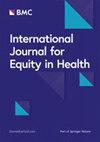A realist impact evaluation of a tool to strengthen equity in local government policy-making
IF 4.5
2区 医学
Q1 PUBLIC, ENVIRONMENTAL & OCCUPATIONAL HEALTH
引用次数: 0
Abstract
Local governments have a critical role to play in addressing health inequities. Health equity impact assessments are recommended to help governments apply an equity lens to the development and implementation of policies and programs. Despite evidence of equity-positive benefits of such tools, adoption remains limited, prompting calls for evaluations to assess their impact and identify factors that will promote uptake across various contexts. We conducted a mixed method study to evaluate the impact of an equity impact assessment (EIA) tool and process on policies and organisational capacity in a local government in Victoria, Australia, and identify factors that influenced this impact. We analysed 33 documents related to 18 EIAs, and conducted surveys (n = 40) and in-depth interviews (n = 17) with staff involved in EIAs. Almost all (17 of 18) EIAs resulted in equity-positive changes to policies and programs, most frequently addressing individual-level factors, such as making community communications and consultations more accessible to under-represented or under-served groups. Structural-level recommendations from one EIA, such as increasing diversity in decision-making panels, were found to impact both the current policy and a broad range of future, related projects and services. Improvements in equity-centric organisational culture and capacity (including staff awareness, skills and confidence) and increased engagement with under-represented communities were also reported. Factors perceived to influence the impact of EIA’s related to organisational commitment and capacity to prioritise equity, process-level factors related to the type and timing of EIAs, and extent of implementation support. Our study supports wider uptake of health equity impact assessments in local government policies and programs. Legislation, leadership and resources from upper-tiers of government can help increase the adoption of equity tools to reduce disparities in population health.对加强地方政府决策公平性的工具进行现实主义影响评估
地方政府在解决健康不公平问题方面发挥着至关重要的作用。建议进行健康公平影响评估,以帮助政府在制定和实施政策和计划时采用公平视角。尽管有证据表明此类工具具有积极的公平效益,但其采用仍然有限,这促使人们呼吁对其影响进行评估,并确定在不同情况下促进采用的因素。我们开展了一项混合方法研究,以评估公平影响评估(EIA)工具和流程对澳大利亚维多利亚州地方政府的政策和组织能力的影响,并确定影响这种影响的因素。我们分析了与 18 项 EIA 相关的 33 份文件,并对参与 EIA 的工作人员进行了调查(n = 40)和深入访谈(n = 17)。几乎所有的环境影响评估(18 项中的 17 项)都对政策和计划进行了积极的公平改革,其中最常见的是针对个人层面的因素,例如让代表人数不足或服务不足的群体更容易获得社区沟通和咨询。一项环境影响评估提出的结构层面的建议,如增加决策小组的多样性,被认为既影响了当前的政策,也影响了未来广泛的相关项目和服务。此外,还报告了以公平为中心的组织文化和能力(包括工作人员的意识、技能和信心)的改善情况,以及与代表人数不足的群体接触的增加情况。被认为影响环境影响评估影响的因素涉及组织承诺和优先考虑公平的能力、与环境影响评估的类型和时间有关的过程层面因素以及实施支持的程度。我们的研究支持在地方政府政策和计划中更广泛地采用健康公平影响评估。上层政府的立法、领导力和资源可帮助更多地采用公平工具来减少人口健康方面的差异。
本文章由计算机程序翻译,如有差异,请以英文原文为准。
求助全文
约1分钟内获得全文
求助全文
来源期刊

International Journal for Equity in Health
Medicine-Health Policy
CiteScore
7.80
自引率
4.20%
发文量
162
审稿时长
28 weeks
期刊介绍:
International Journal for Equity in Health is an Open Access, peer-reviewed, online journal presenting evidence relevant to the search for, and attainment of, equity in health across and within countries. International Journal for Equity in Health aims to improve the understanding of issues that influence the health of populations. This includes the discussion of political, policy-related, economic, social and health services-related influences, particularly with regard to systematic differences in distributions of one or more aspects of health in population groups defined demographically, geographically, or socially.
 求助内容:
求助内容: 应助结果提醒方式:
应助结果提醒方式:


